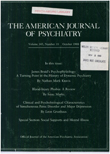A validity study of axis II of DSM-III
Abstract
The authors examine DSM-III personality disorders in a longitudinally followed community sample of middle-aged inner city men. Eighty-six (23%) of the subjects received an axis II diagnosis of personality disorder. Although these men received relatively little psychiatric attention, they were severely impaired in terms of how they felt about themselves, how others saw their global mental health, and their ability to work and to love. When the strong overlap with alcoholism was controlled for, personality disorder was clearly related to adaptive problems that manifested by early adolescence. The evidence suggests that early deficiencies of biology, environmental support, and ego strength contribute to the development of personality disorder.
Access content
To read the fulltext, please use one of the options below to sign in or purchase access.- Personal login
- Institutional Login
- Sign in via OpenAthens
- Register for access
-
Please login/register if you wish to pair your device and check access availability.
Not a subscriber?
PsychiatryOnline subscription options offer access to the DSM-5 library, books, journals, CME, and patient resources. This all-in-one virtual library provides psychiatrists and mental health professionals with key resources for diagnosis, treatment, research, and professional development.
Need more help? PsychiatryOnline Customer Service may be reached by emailing [email protected] or by calling 800-368-5777 (in the U.S.) or 703-907-7322 (outside the U.S.).



